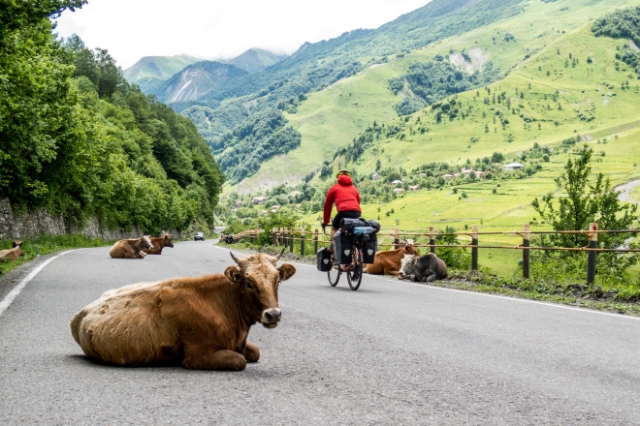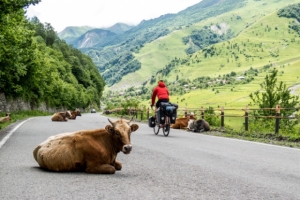Cattle on the Highway
OP-ED
A couple of years ago, I had a funny accident on the road – I bumped into a cow. Not my fault though! The cow was crossing the central road of the periphery, and all of a sudden, she turned around, scared off by the oncoming vehicle. Consequently, I was fined by the state and sued by the owner of the animal. In a word, the unfortunate incident cost me, the innocent lamb, more than a nickel. This is the end of the entertaining part of the story.
On a more somber count, ‘cattle on the road’ is a huge traffic problem in this country. A summer spent in western Georgia on the comfy beaches of the Black Sea is a real gift from God. Who could have imagined just a quarter of a century ago that the place would become full of state-of-the-art hotels with every possible amenity at a man’s service; high-class freeways with expensive cars of every brand and make; stylish restaurants and various exotic eateries every step of the way, with overdressed, or conversely, very scantily clad and gorgeously tanned beauties of the nation and gentlemen in their elegant attendance – all of them creating an impression of the acme of civilization, and all of a sudden, like a wakeup call – cattle on the highway!
Let me put it a little clearer: in western Georgia (and not only there), where the warm waters of the Black Sea tenderly wash the shores of the Kingdom of Colchis and where the current Georgian opulence is lavishly sparkling, one sees cattle on paved roads everywhere, either relaxing on the hot asphalt or lazily crossing the road where cars are moving at a permissible but still high speed. Here is the tangible picture: nobody wants to cripple or kill cattle, especially if the cattle belong to somebody else. And they belong to local people who are living in the vicinity of those roads. They have a strange way of operating their family business. The cattle, especially the cows, are trained to find their homes on their own. The owners are invisible, sitting at home and waiting for their feeders in front of their gates to take further care of them. From dawn to twilight, the animals exist in the rank of independent travelers and gatherers of food. Man is irrelevant at this particular point of their routine. As a result, the nerves of the drivers are strained, brakes are overused, accidents happen, fines are paid, courts are crowded and foreign guests visiting Georgia are falling under the first extraordinary impression.
It is also true though that the drivers are used to the scenery – sensing the peril from a distance, they usually slow down and carefully pass the cows, trying to stay as clear from them as possible. Some foreign travelers have some fun, laughing, tooting their horns and excitedly pointing fingers, taking pictures and looking back if they are fortunate enough to pass the cows peacefully, and memorizing Georgia as a country of mixed civil culture at the best.
Where are the police at this time? Busy pulling reckless drivers over onto the shoulder of the road to teach them a lesson in lawful driving. But they are not conscious of the fact that a couple of kilometers away from their regular traffic regulation post, endangered citizens and animals might be intertwined in weird man-to-animal traffic puzzles. This uncivilized situation might be handled in a very civilized fashion: unattended cattle cannot be on the roads; there might be a special fixed time and place for cattle to cross roads in human attendance; animals should only be where they belong: farms, homes, pastures, etc. fz-5.com/pocha/ Perhaps this weird problem can be handled only via legislature: there has to be a law that will take care of this national embarrassment, astonishing the curious foreign eye and bothering thousands of people on the road, as well as putting the poor animals at an explicit risk. Well, the world has seen big, white and long-horned cows in the streets of Indian towns, but this might be a bad comparison if we manage to honestly recognize the difference!
By Nugzar B. Ruhadze
Image source: www.fwi.co.uk












